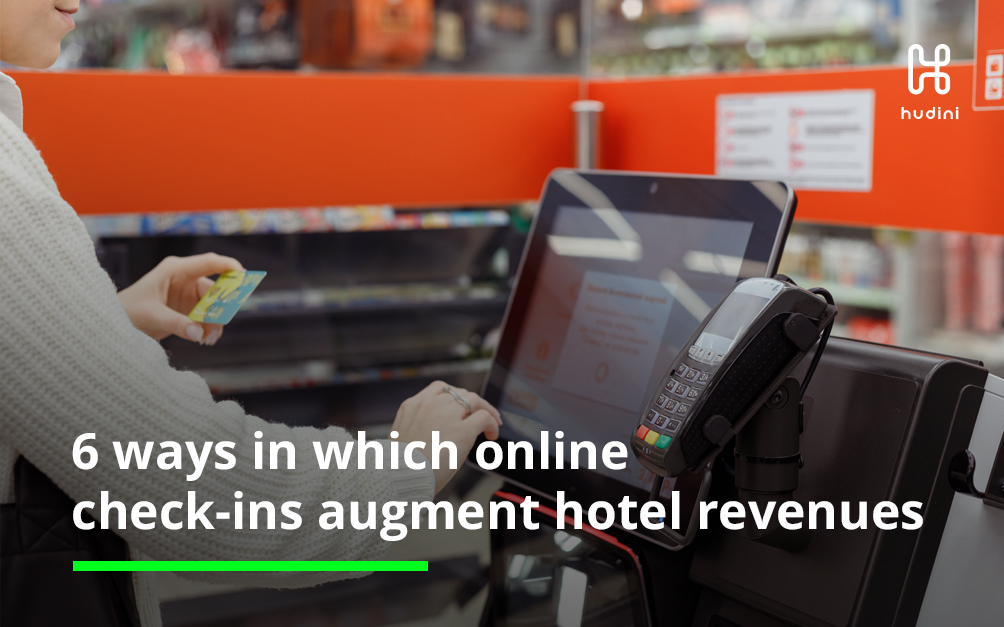
6 ways in which online check-ins augment hotel revenues
- Hudini
The hotel lobby is designed to be inviting and make guests feel they’ve arrived at someplace special. However, the conventional check-in process isn’t. It’s slow and tedious, often resulting in tired guests waiting to be either attended to or assigned a room. Online check-ins resolve the snags of the traditional arrival formalities, enabling guests to check-in at their convenience by using their mobile device or the automated kiosk in the lobby. By making the arrival process faster and more guest-centric, online check-ins are doing more than just improving guest experience; they’re also setting the stage for a timely upsell.
Online check-ins offer guests more convenience and customization. The Hudini hospitality platform, for example, gives guests the option of checking-in through the hotel app, the progressive web app (PWA) or using the kiosk in the reception area. Some hotels even offer assisted check-ins, where staff members complete the online check-in after escorting guests to their rooms. Once they have verified their IDs digitally, guests can also customize their stay by selecting upgrades such as early check-in and late check-out, the room type and view, proximity to smoking zones as well as the floor level.
The benefits of online check-ins are cumulative. PwC surveyed 15,000 people to understand the impact that experience has on purchase decisions. They found that “43% of all consumers would pay more for greater convenience; 42% would pay more for a friendly, welcoming experience.” Here’s a look at how online check-ins contribute to better guest experience while ticking all the boxes for revenue generation.
- Personalized upgrades
Hospitality apps like Hudini help create 360 degree guest profiles while connecting the various touchpoints of the guest journey. Prior to or during online check-in, guests share a few preferences. These along with information such as the purpose of travel, number of guests and duration of the visit can be leveraged to make personalized recommendations for their stay; for example, room upgrades, add-on amenities and special packages. Hotels are getting creative and more differentiated in their suggestions, with some offering bar coupons for business travelers checking-in at night, and special kids’ meals for families traveling with children.
- Superior guest experience
When guests see upgrades that will genuinely enhance their stay rather than irrelevant add-ons, they’re more likely to purchase them. For example, a couple celebrating their anniversary will appreciate the offer of a personalized candlelit dinner at the restaurant. While this certainly contributes to the hotel’s ancillary revenue, it also makes the couple’s stay more memorable. Happier guests make for healthier revenues. In fact, PwC found that guests are willing to spend an additional 14% on excellent customer experience at hotels.
- Improved staff efficiencyWhen check-ins are automated, staff don’t have to grapple with long queues or repetitive paperwork and cross-checking payments.
This leaves them with more time and energy to engage with guests, showcase the hotel’s attractions, and make them feel truly welcome. These interactions also give staff an insight into the guests’ preferences, enabling them to suggest valuable upgrades. Attentive, courteous staff also improve guest experience, creating a positive feedback loop.
- Reduction of paper and plastic usage
Online check-ins do away with multiple sets of forms, print-outs of guest IDs and payment slips. When guests check-in using the native hotel app, they can also use it as a digital door key, thereby avoiding plastic key cards. It also eliminates the need to issue a duplicate key in case the original is misplaced. These measures are more cost-effective and sustainable in the long run.
- Loyalty programs
Using notifications on the app or kiosk, hotels can invite guests who are checking-in to join their loyalty program and earn points for every purchase. For guests, this adds value to each transaction and incentivizes them to consider the same hotel chain for their next trip, building long-term loyalty for hotels.
- Convenient and secure payments
E-commerce has made online purchases easier and more spontaneous. Hudini’s online check-in interface is similarly integrated with payment gateways to facilitate seamless and secure transactions. This allows guests to view several offers and complete their purchase through the app or kiosk, without having to visit the front desk. Guests who are checking-in through the hotel app or PWA enjoy a further advantage – they can select and pay for their upgrades even before reaching the hotel.
Online check-ins are one of the most popular digital transformation initiatives being undertaken by hotels. While their ease and efficiency delight guests, hotel operators are realizing that they also offer excellent ROI. Hotels should ensure that guests are not overwhelmed by offers, but targeted with two or three that are the most helpful and relevant. Ultimately, like all things in hospitality, the most rewarding initiatives are those that prioritize the guest.
Engage, Elevate.

Join our mailing list
Enter your email address


